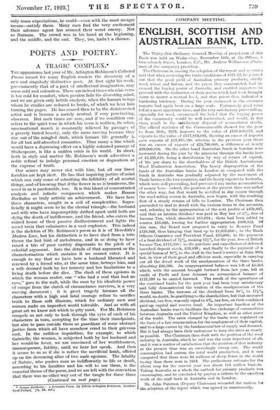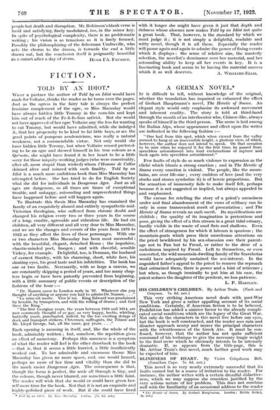POETS AND POETRY.
A TRAGIC COMPLEX.*
THE appearance last year of Mr. Arlington Robinson's Collected Poems meant for many English readers the discovery of a
new and singularly distinctive poet. At first sight his work, pre-eminently that of a poet of intellectual imagination, may seem -cold and colourless. There are indeed times when his verse is too cold for comfort, when passion fails his dissecting mind, and we are given only brittle analysis, when the human beings whom he studies are reduced to books, of which we hear him turning the pages. He has ceased then to be the disinterested artist and is become a merely neutral, if very penetrating, observer. But such times arc rare, and if we condition our- selves to the quiet tone in which his verse is written, its sober, unsensational march is constantly relieved by passages of a gravely tinted beauty, only the more moving because they rise out of the mingled drab, which human life generally is for all but self-absorbed romantics. Thus many a line which would have a depressing effect on a highly coloured passage of Shakespeare, is like a sudden crisis in his world. In short, both in style and matter Mr. Robinson's work advertises a noble refusal to indulge personal emotion or dogmatism at the expense of truth.
Our senses may never riot with him, but all our finest faculties are kept alert. He has that inquiring justice of mind which can only come of admitting the fallibility of all mortal things, and of knowing that if the flower in us is beauteous, the weed in us is pardonable, too. It is this blend of concentrated
analysis and infinite compassion which makes Roman Bartholow so truly, artistic an achievement. We have here three characters, caught in a coil of complexities. Super-
ficially it might seem to be the eternal triangle—the husband and wife who have imperceptibly drifted apart until both are dying the death of indifference, and the friend, who enters the
ruined house of- their passive disillusionment and lights the
secret train that culminates in a vast explosion. This indeed is the skeleton of Mr. Robinson's poem as it is of Meredith's
Modern Lore, but his distinction is to have shed from a trite
theme the last hint of melodrama, and in so doing to have raised a trio of poor earthly disputants to the pitch of a celestial argument. Into the details of that argument or the characterization which sustains it we cannot enter. It is enough to say that we have here a husband liberated and renewed by a friend who, at the same time, betrays him, and a wife doomed both by her honesty and her limitations to a living death before she dies. The clash of these egoisms in which the woman realist, one "who had a soul that had no eyes," goes to the wall, while the man by his idealistic power of escape from the clutch of circumstance survives, is a very moving document ; it is great tragedy because all the characters with a high and fatal courage refuse to sacrifice truth to those soft illusions, which for ordinary men and women make an imperfect world tolerable. And as with all great art we know not which to pity most. For Mr. Robinson compels us not only to look- through the eyes of each of his characters in turn, accepting for the time their standpoints, but also to pass outside them as guardians of some abstract justice from which all have somehow erred to their grievous
cost. In the ruthless inquisition, for example, to which
Gabrielle, the woman, is subjected both by her husband and her would-be lover, we are convinced of her worthlessness, inconsequence, futility, until, we hear her speak. And then it seems to us as if she is rather the sacrificial lamb, offered up on the devouring altar of two male egoisrns. The fatality of Nature, who pushes man so indifferently to life or death, according to his faculties and his will to use them, is the essential theme of the poem, and we are left with the conviction that there was no other way out of the tangle for these three (Continued on next page.) • Roman BartAoloto : a Dramatic Poem, By Edwin Arlington Robinson. London: 1:ecil Palmer, F7s. Od. net.)
people but death and disruption. Mr. Robinson's blank verse is lucid and satisfying, finely modulated, too, in the minor key. In spite of psychological complexity, there is no problematic writing ; his vision is as tenacious as it is finely focused. Possibly the philosophizing of the fisherman Umfraville, who acts the chorus to the drama, is towards the end a little drawn out, but the conclusion itself is poignantly beautiful
as a sunset after a day of storm. HUGH I'A. FAUSSET.



























































 Previous page
Previous page